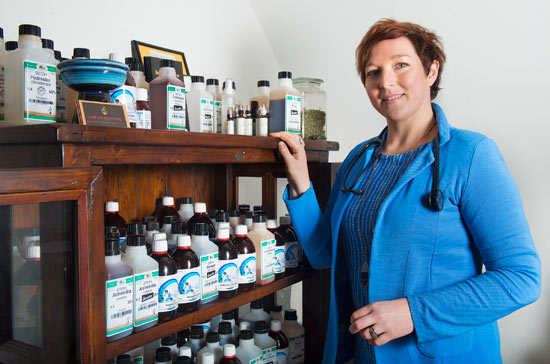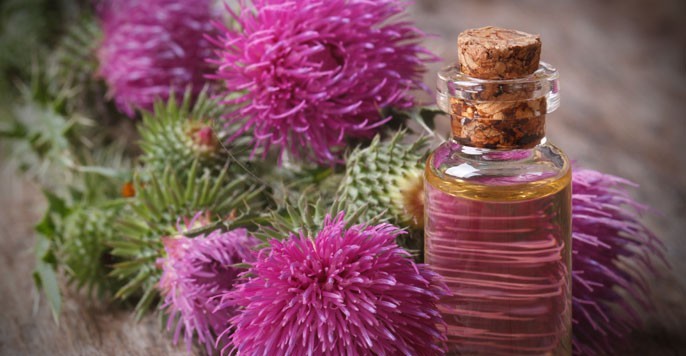Jan 31, 2014
Forget the fads, find the roots
Recent interview with the Mayo News

ALL NATURAL Naturopath and medical herbalist Colleen Kennedy in her clinic in Rosbeg, Westport.
Pic: Michael McLaughlin | Interview By: Ciara Moynihan
Another January, another health kick. Most of us are all-too susceptible to the quick-fix health fads that surface yearly, however far-fetched. You find yourself seriously contemplating a betel-nut, lichen and manuka-honey shake, or a five-hour yoga session wrapped in cling film and burning sage.
Even if we opt for a single life-style change that’s a little more realistic (and, hopefully, less dangerous), how many of us have fallen into the January self-reinvention trap, only to lose enthusiasm (or stomach lining) and, worse, turn our failure into a stick with which to beat ourselves? This annual ritual is, of course, the opposite of healthy.
Perhaps we’re approaching the whole enterprise the wrong way. That would most definitely be the opinion of naturopath and medical herbalist Colleen Kennedy, who says that one of the many pitfalls to achieving optimum health is our tendency to focus on one area (strength, stress, gut, agility, love handles – take your pick) rather then the whole shebang. Or, as Colleen would put it, we fail to look at our health holistically.
Born and bred in Westport, Colleen Kennedy left in her 20s to go travelling. She spent some time in India and Nepal, before returning to Ireland in 2006 to attend the College of Naturopathic Medicine in Dublin, where she competed a five-year part-time course.
A mother to two small children, the part-time nature of the course was perfect, allowing her to achieve balance in her life – a principle that governs much of her outlook. Colleen now runs a clinic based in the Body and Mind Health Centre in Rosbeg, Westport.
Herb power
As a medical herbalist, Colleen is an enthusiastic exponent of the power of herbs to treat human ailments and boost health. “Eighty percent of the world’s population today still use herbal medicine as their primary health care … we’re actually in the minority here in the Western world,” she says. “Ireland has a very long heritage of using herbal medicine as a primary health-care system: It’s only in the last 100 years really that we’ve lost that. I think it’s having a resurgence now, though, and it’s great to be a part of it, using plant medicine to help heal the body – and the mind as well.”
Advocates of herbal medicine believe it can offer benefits over and above mainstream medicine. “When you’re using whole plants and whole herbs, you have less likelihood of side-effects from isolated compounds, which have been taken from herbs to make drugs,” Colleen maintains.
However, many worry that medical herbalism is unregulated. “Herbal medicine is going through a process of regulation at the moment,” assures Colleen. “I think it’s good that it is, but it’s a difficult one to regulate, because we’ve plants growing around us everywhere – people are free to grow a lot of different medicinal plants in their own garden.
“It’s really about using a commonsense approach and consulting a qualified herbalist if you are taking lots of medication. That does require some level of supervision. We’re trained to know drug and herb interactions, and we’re able to prescribe then around that. Safety and ‘First, do no harm’ are naturopathic principles. If we cannot prescribe certain herbs [because of potential interactions], we can still do an awful lot of work around a problem.”
Getting to the root
So do naturopathy and herbalism complement each other? “Oh absolutely. Naturopathy gives you a much broader scope for treating a person holistically, rather than just focusing in on one area,” Colleen explains. “Herbal medicine would be the main tool that I use to help and support the body’s systems, but I use naturpathy in nutrition, as well as traditional Chinese diagnostic tools and ayurveda, which is the Indian science of medicine.”
Colleen defines naturopathy as ‘getting to the root of the problem’. “It’s treating the person holistically, so looking at their diet, their lifestyle, the emotional aspects of what’s going on in their lives as well, and how that might be affecting stress levels, relaxation – all of that, combined. But really we’re looking at paring it back, finding the root cause of the problem so we can get in there at a functional level, a cellular level, and work out a long-lasting treatment from that starting point. It’s not a quick-fix solution.”
Treating the person
A lot of people are curious about the sorts of ailments, complaints and maybe even wishes that people might come to Colleen with. “I get asked about it a lot, and they’re questions that I always hesitate to answer, because with naturopathy and herbal medicine, you’re treating the actual person and not the condition, so again it’s about getting to the root cause of the person’s problem.
“While a cold and a flu are very well treated by herbal medicine, I’d be looking at the history of that person who was getting the cold and flu, at whether it’s an acute situation, at whether there is long-term immune disfunction going on.
“I treat quite a range of ailments that come into the clinic. I do food intolerance testing as well, so anything from digestive disruption to hormonal imbalances to nervous-system problems. All of the body systems can be supported with herbal medicine.”
Supporting mental health
Treating the person, the whole person, can also involve attending to mental health and wellbeing, as well as physical symptoms, says Colleen. “Today, there are a lot of stressed people out there. Herbs – adaptogenic-type herbs – work on your endocrine system. A lot of people would be familiar with them as over-the-counter herbs, like rhodiola and Siberian ginseng. All of these herbs work really well to help people cope, respond and deal with stress on a physical and mental level much better. So they’re a very good support system for people.”
When it comes to taking charge of our health and wellbeing, Colleen believes the chief obstacle is our relentless focus ‘outwards’. “People need to tune in to themselves more. I think we’re so focused outwards these days – we’ve a lot of technology around us. We’re on our phones, we’re on our computers … we’re not really listening to ourselves very much.
“We’re on the go a lot, and we want the quick fix so we can continue on with our busy lifestyle. For me, a lot of the work is about helping people to pull out of that mindset, to take a breath and actually learn about themselves. In a lot of the consultations, I teach people about their own individual constitution and what suits them better – because everybody is different.
“When someone comes in for a consultation, we go through their unique make up and how to best balance that for them. Teaching people about long-term health solutions and not quick-fix solutions is really what I do a lot of.
“This time of year, straight after Christmas, people do the fad two- or three-day cleanse, and then what after that? I’m very much about teaching people about how to have long-term, sustaining health care.”
It’s elementary
While Colleen is focused on long-term solutions rather than the quick fix, she does advocate one simple step that can yield immediate benefits: “It really is a simple thing, but drinking more water. People don’t drink enough water. Your body is naturally cleansing itself every day. Water really helps every cellular process in the body … it is the number-one easy, cheap health tip.”
She is keen to point out that the water should be fresh and clean, and filtered if possible. Flavoured water doesn’t count, she says, explaining that it often contains artificial sweeteners, as do a lot of ‘diet’ soft drinks. “People are being very misled by supermarkets and by marketing campaigns. You really have to be very discerning nowadays, because something that has no added sugar could have a lot of artificial sweeteners in it, like aspartame, which is very detrimental to the liver.”
Nurturing nutrition
Colleen is a huge fan of fresh vegetable juice, which she says is another way of keeping the body happy and healthy throughout the year, changing the vegetables to suit the season.
Swerving processed food is another tip. “Processed food tends to have a lot of sugar, salt and hydrogenated fat, and they’re three no-nos really for me. Then you also have preservatives and additives in there as well, so you’re really adding to your toxic load by eating processed food,” she says.
“Keeping it simple is important too. There’s no need to get all bogged down in a healthy diet. Fruit, vegetables and lean meats if you’re eating meat or plenty of pulses and legumes if you’re vegetarian. It’s very easy.”
Lifestyle choices
Other than taking herbs and eating right, what else can we do? Colleen has insights here too: “Lifestyle-wise exercise is important. So too is some quiet time in the day, which isn’t easy to find – I know I find it difficult myself. Life has become very, very busy for people, but it’s really important to process everything that’s going on around you in a quiet moment. That could mean doing some kind of meditation, switching off the TV at night before you go to bed, having some quiet time for reflection in your day, in your week. Those sorts of things are very important for mental health, and that’s a big issue today for people.”
Courses and cleanses
As well as her practice, Colleen runs part-time (one evening a week) courses over four weeks on herbal medicine. During these ‘Hedgerow to Kitchen Medicine’ courses, she teaches participants how to make some simple herbal medicines, and more. “One of the weeks I do a lot on nutrition and how to make some balanced, healthy meals – how to use some of these common ‘super foods’ that we have here in Ireland. We don’t need to be stretching as far away as New Zealand or Peru for them!” The course covers immune and respiratory health, naturopathic first aid and external preparations, naturopathic nutrition and digestive health, and natural skincare and cosmetic making.
Colleen will also be running an ayurveda-based cleanse later in the spring. “I recommend a seven-day programme, and I go through it with participants before they start and then I see them on the very last night. People have found it very useful, and once they’ve done it, it’s a tool they’ll have for life.”
And the best thing? Not a cling-film wrap in sight.
Colleen Kennedy’s next ‘Hedgerow to to Kitchen Medicine’ course starts on Wednesday, February 27. She will also be running a seven-day cleanse, beginning on March 20, after an introduction night on March 18.
For more information on these and other courses, as well as private consulations,
visit www.herbalhealthcare.ie, email colleen@herbalhealthcare.ie or
call 087 9942291.

